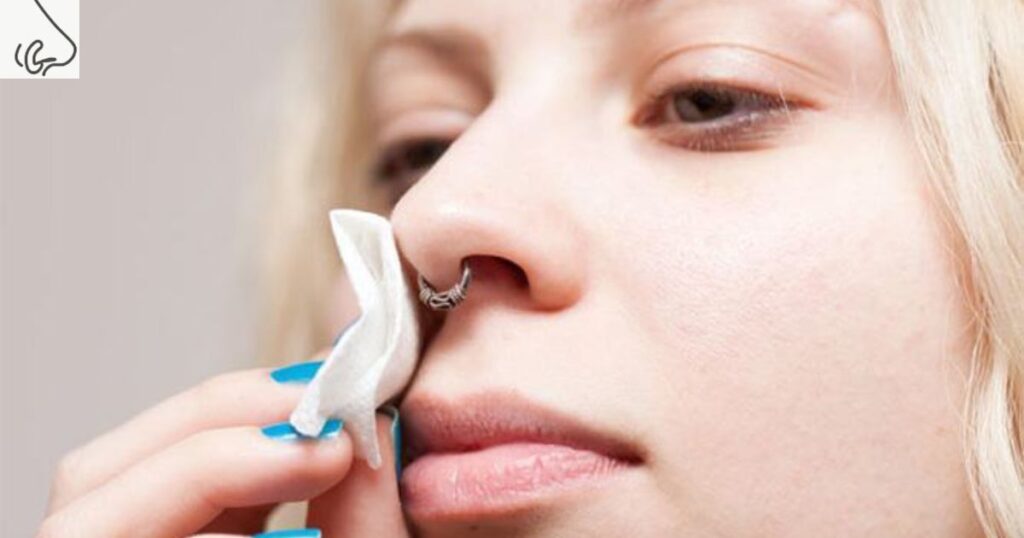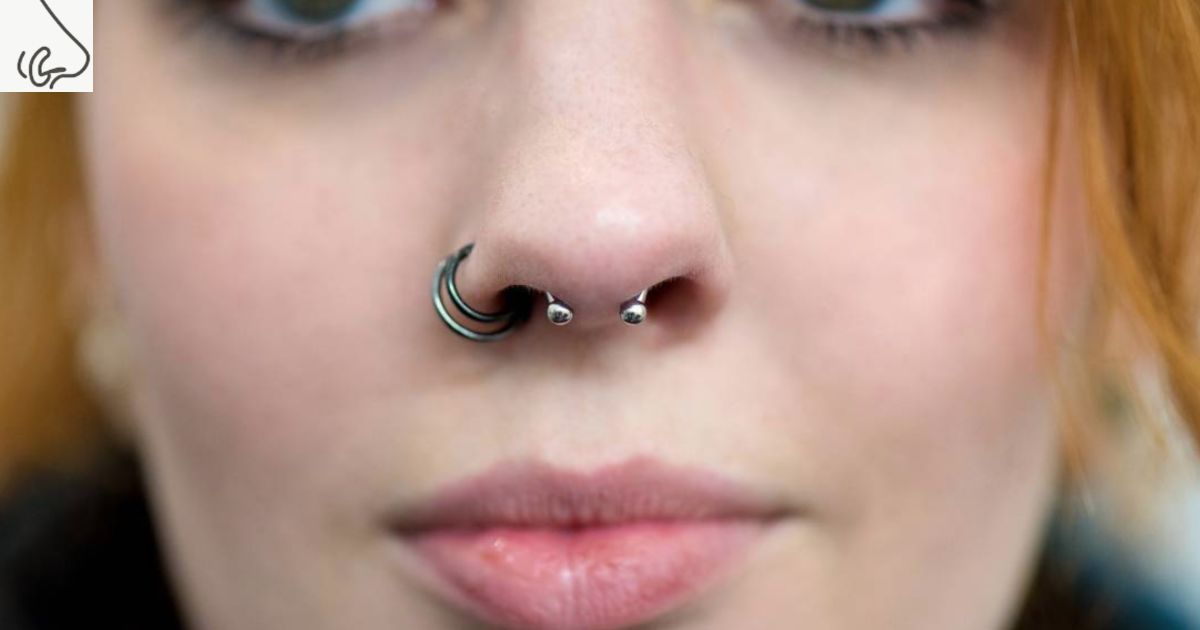When a nose piercing emits an unpleasant odour, it’s often referred to as nose piercings stink. This smell can be caused by various factors related to the healing process, accumulation of debris, or bacterial activity in the pierced area.
Why do nose piercings stink? The answer lies in the delicate healing process and the accumulation of debris that occurs in and around the piercing. This can lead to a distinct smell that concerns many individuals with nose piercings.
Nose piercings can sometimes emit an odour due to the presence of bacteria, dead skin cells, or residue from healing solutions. Proper cleaning, appropriate jewellery, and attentive aftercare are essential to prevent and alleviate this issue.
The Science of Odor in Nose Piercings
When a nose piercing emits an unpleasant smell, it’s often a result of various factors in the healing process. The scent might stem from the accumulation of debris or the activity of bacteria around the piercing. The healing process of a nose piercing involves the regeneration of skin cells and the release of bodily fluids.
The presence of bacteria is another significant factor contributing to nose piercing odors. Bacteria naturally reside on the skin, and when a piercing is healing, these microorganisms can thrive in the warm, moist environment created around the piercing. Their metabolic activities can generate byproducts, resulting in an unpleasant smell that’s noticeable to the individual with the piercing.
Common Causes of Nasal Piercing Odor

One of the primary reasons for the smell associated with nose piercings is the collection of sebum, a waxy, oily substance produced by the body’s sebaceous glands. This sebum, along with sweat, dead skin cells, and other debris, can gather around the jewelry, forming a conducive environment for bacterial growth and subsequent odor.
Sometimes, the choice of jewelry, especially if it’s made of materials causing reactions, can also contribute to the smell. Inadequate cleaning or excessive touching of the piercing can introduce more bacteria, exacerbating the odor. Certain environmental factors, like pollution or exposure to unclean water, can also influence the scent of a healing piercing.
Bacterial Culprits Why Nose Piercings Stink
| Bacterial Species | Effect on Odor |
|---|---|
| Staphylococcus aureus | Can contribute to a foul, pungent odor |
| Pseudomonas aeruginosa | Produces a distinct, slightly sweet scent |
| Escherichia coli | May create a faintly sweet or metallic odor |
| Corynebacterium species | Causes a mild, sweet smell in some cases |
Bacteria play a pivotal role in the odor associated with nose piercings. Different bacterial species, such as Staphylococcus aureus or Pseudomonas aeruginosa, contribute to the distinct smells observed around healing piercings. Staphylococcus aureus, a common skin bacteria, can produce a foul, pungent odor, while Pseudomonas aeruginosa might lead to a slightly sweet scent.
Preventive Measures to Avoid Unpleasant Odors
Maintaining good hygiene practices is the cornerstone of preventing nose piercing odor. Regular cleaning with saline solution or a gentle soap helps to remove debris and curb bacterial growth. Avoiding excessive touching or rotating of the jewelry minimizes the transfer of bacteria from hands to the piercing site.
Opting for high-quality jewelry made from materials suitable for healing piercings is essential to avoid adverse reactions and subsequent odors. Proper aftercare, including avoiding harsh chemicals or makeup around the piercing, can help in preventing unnecessary irritation and subsequent odor.
Personal Hygiene and Nose Piercing Smell
Personal hygiene practices are directly linked to the presence or absence of odor in nose piercings. Ensuring regular and proper cleaning of the piercing site is vital. Gently cleansing the area with a saline solution or mild soap helps remove accumulated debris and prevents bacterial colonization.
Keeping the surrounding skin dry and clean also aids in avoiding the development of odor-causing bacteria. Furthermore, adopting habits like washing hands before touching the piercing and refraining from excessive contact with unclean surfaces can significantly reduce the introduction of harmful bacteria.
Jewelry Choices and Nose Piercing Odor
The choice of jewelry significantly impacts the healing and odor associated with nose piercings. Opt for materials like titanium, surgical stainless steel, or niobium for initial piercings, as they are less likely to cause adverse reactions. Avoid materials like nickel or low-quality alloys that can lead to skin irritation and subsequent odors.
It’s essential to select jewellery that allows for proper air circulation around the piercing to aid in the healing process. Moreover, regularly inspecting jewelry for signs of wear or damage and replacing it when necessary prevents potential infections or odors caused by deteriorating jewellery.
How to Deal with a Stinky Nose Piercing
If you notice an unpleasant smell from your nose piercing, don’t panic. Start by reassessing your cleaning routine and ensuring you’re not overcleaning or using harsh products that might irritate the piercing. Stick to a routine of gentle cleaning with saline solution or mild soap, ensuring you dry the area properly after cleaning.
Consider changing your jewellery to a high-quality, hypoallergenic material and avoid unnecessary touching or rotating of the piercing. If the smell persists or is accompanied by signs of infection, seek guidance from a professional piercer or a healthcare provider.
When to Seek Professional Help for Odorous Piercings
If the odor from your nose piercing, as detected by the Look With A Nose Piercing App, is accompanied by redness, excessive swelling, pus discharge, or intense pain, it could indicate an infection. In such cases, seeking advice from a professional piercer or a healthcare provider is crucial.
They can evaluate the situation, provide guidance on proper care, and, if necessary, prescribe antibiotics to address the infection and the associated odor. Remember, a nose piercing is a wound that requires proper care and attention. Prompt action and professional advice can prevent complications and ensure a healthy healing process for your piercing.
FAQs
How often should I clean my nose piercing?
Regular cleaning with a saline solution or gentle soap twice a day is typically recommended to prevent odor and promote healing.
Can the choice of jewelry affect the smell of a nose piercing?
Yes, certain materials like titanium or surgical stainless steel are less likely to cause reactions and subsequent odors compared to nickel or low-quality alloys.
What should I do if my nose piercing smells bad?
Reassess your cleaning routine, ensure proper hygiene, consider changing your jewelry, and consult a professional if the odor persists or worsens.
Is it normal for a new nose piercing to smell?
Yes, during the healing process, some smell due to the accumulation of debris and bacterial activity is common, but it should improve with proper care.
Conclusion
In the end, understanding why nose piercings stink comes down to a combination of factors. The accumulation of sebum, sweat, and dead skin cells, along with bacterial activity, creates an environment conducive to odor. Proper hygiene, choice of jewelry, and personal care play vital roles in mitigating this issue.
By adopting these practices and being vigilant about any signs of infection, individuals can enjoy their nose piercings without the worry of unpleasant smells. So, keep your nose piercing clean, choose suitable jewelry, and stay proactive in your aftercare to ensure a fresh and odor-free experience. Your commitment to proper care will help you rock your nose piercing with confidence.



















